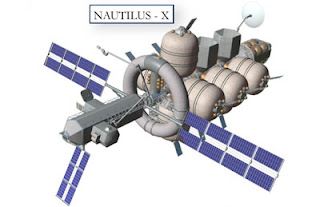My 2010 Review
I started this year thinking the Augustine committee had nailed the Moon shut. Considering that I was a proponent of Constellation before the Augustine committee, that's pretty significant. If I go back to that time and see what I was saying to people, most of it was explaining the flexible path as an alternative to sitting on the ground waiting for a booster and a capsule and a lander to be developed by NASA.
I end this year thinking that the Moon isn't nailed shut. SpaceX has demonstrated that making a capsule and booster need not be expensive. Armadillo Aerospace and the other contractor's work on Project M (now Project Morpheus) demonstrated to me that going to the Moon need not be expensive. Tim Pickens and the Rocket City Space Pioneers have successfully restored my faith that the Google Lunar X-Prize will be won. Paul Spudis has actually become a robotic exploration advocate! In a few years time it won't be absurd to suggest that a commercial effort could send a rover to characterize the polar ice, make money by selling data to NASA, and later start selling lunar derived propellant in orbit.
I don't mean to suggest this negates the need for heavy lift. Actually, quite the opposite. I mean this to demonstrate that my belief that lunar exploration was necessarily expensive is slowly going away. With that frame of reference, I have to admit that maybe my belief that heavy lift is also necessarily expensive may have to go away. SpaceX have suggested they can do 130t to LEO for $2.5B in development costs and $300M per flight.
But the other problem with heavy lift is that it's a gate keeper. The advocates are perfectly happy to say that the Moon (or any beyond Earth target really) is off limits without heavy lift. This is simply wrong. We don't need heavy lift to send rovers to Mars so I think it is pretty clear that we don't need heavy lift to send rovers to the Moon.
Humans weigh less than rovers.
The problem is the can't-do attitude.
I end this year thinking that the Moon isn't nailed shut. SpaceX has demonstrated that making a capsule and booster need not be expensive. Armadillo Aerospace and the other contractor's work on Project M (now Project Morpheus) demonstrated to me that going to the Moon need not be expensive. Tim Pickens and the Rocket City Space Pioneers have successfully restored my faith that the Google Lunar X-Prize will be won. Paul Spudis has actually become a robotic exploration advocate! In a few years time it won't be absurd to suggest that a commercial effort could send a rover to characterize the polar ice, make money by selling data to NASA, and later start selling lunar derived propellant in orbit.
I don't mean to suggest this negates the need for heavy lift. Actually, quite the opposite. I mean this to demonstrate that my belief that lunar exploration was necessarily expensive is slowly going away. With that frame of reference, I have to admit that maybe my belief that heavy lift is also necessarily expensive may have to go away. SpaceX have suggested they can do 130t to LEO for $2.5B in development costs and $300M per flight.
But the other problem with heavy lift is that it's a gate keeper. The advocates are perfectly happy to say that the Moon (or any beyond Earth target really) is off limits without heavy lift. This is simply wrong. We don't need heavy lift to send rovers to Mars so I think it is pretty clear that we don't need heavy lift to send rovers to the Moon.
Humans weigh less than rovers.
The problem is the can't-do attitude.


Heavy Lift as Gatekeeper is an excellent analogy, and Gatekeeper pretty much describes NASA's entire history. Without an information gatekeeper, newspapers die and online news sources flourish. Without an orbital access gatekeeper, business in space will flourish.
ReplyDeleteI very much like the idea of selling data acquired by robots on the moon. Data is easily returned to Earth and has value to some customer (not necessarily NASA); if the data returned is worth more to the customer than your investment, you've got a possibly-profitable business.
Humans weigh less than (some) rovers, but unless you're proposing a one-way suicide mission, the propellant needed to return a human to the Earth still weighs a lot.
ReplyDeleteAnonymous, whoever you are, see the earlier lunar architecture posts I've written. Staging storable propellant in LLO or on the lunar surface is the easiest solution. Rendezvous and precision landing are both proven technologies that weren't available back in the Apollo days.
ReplyDelete